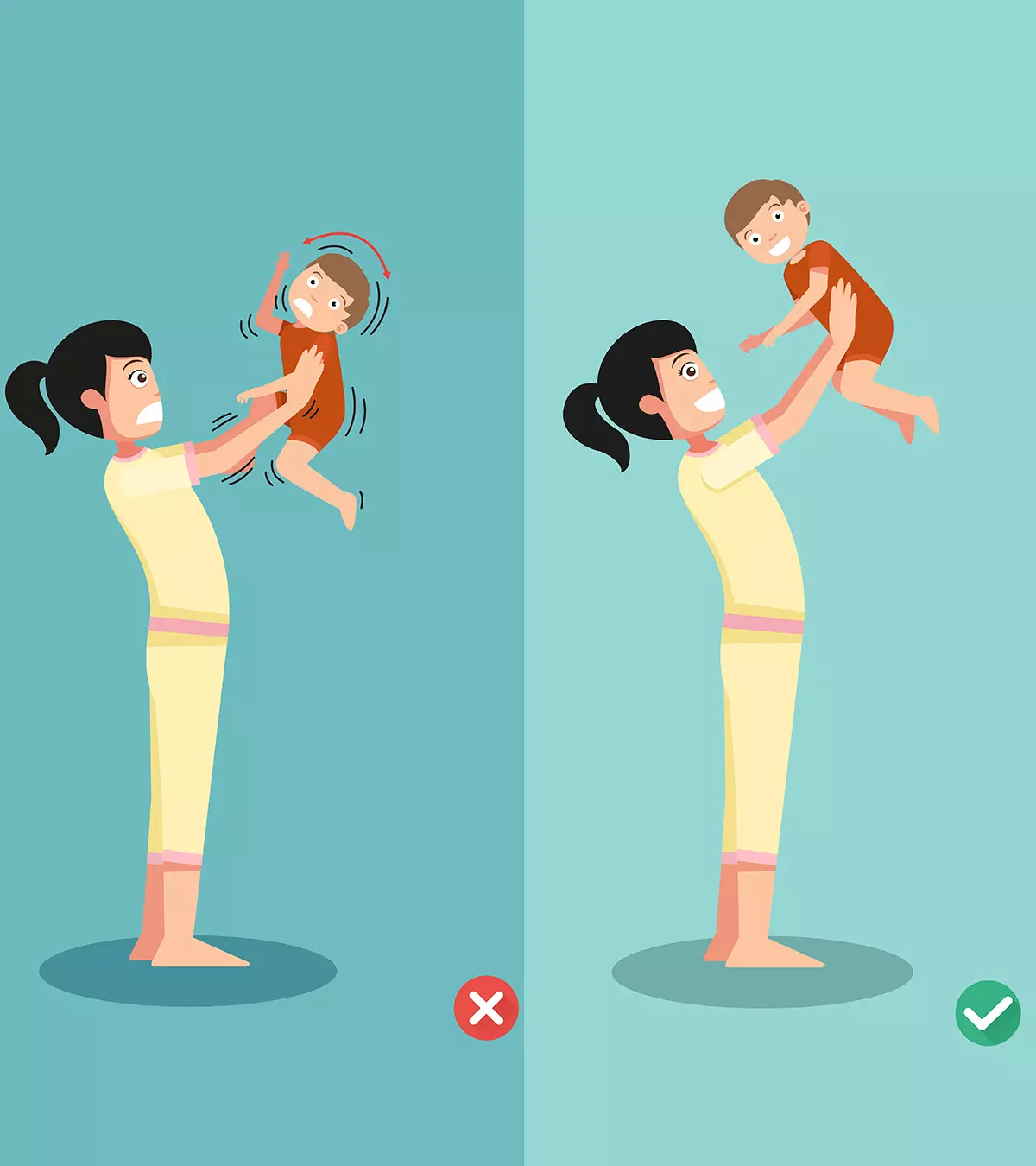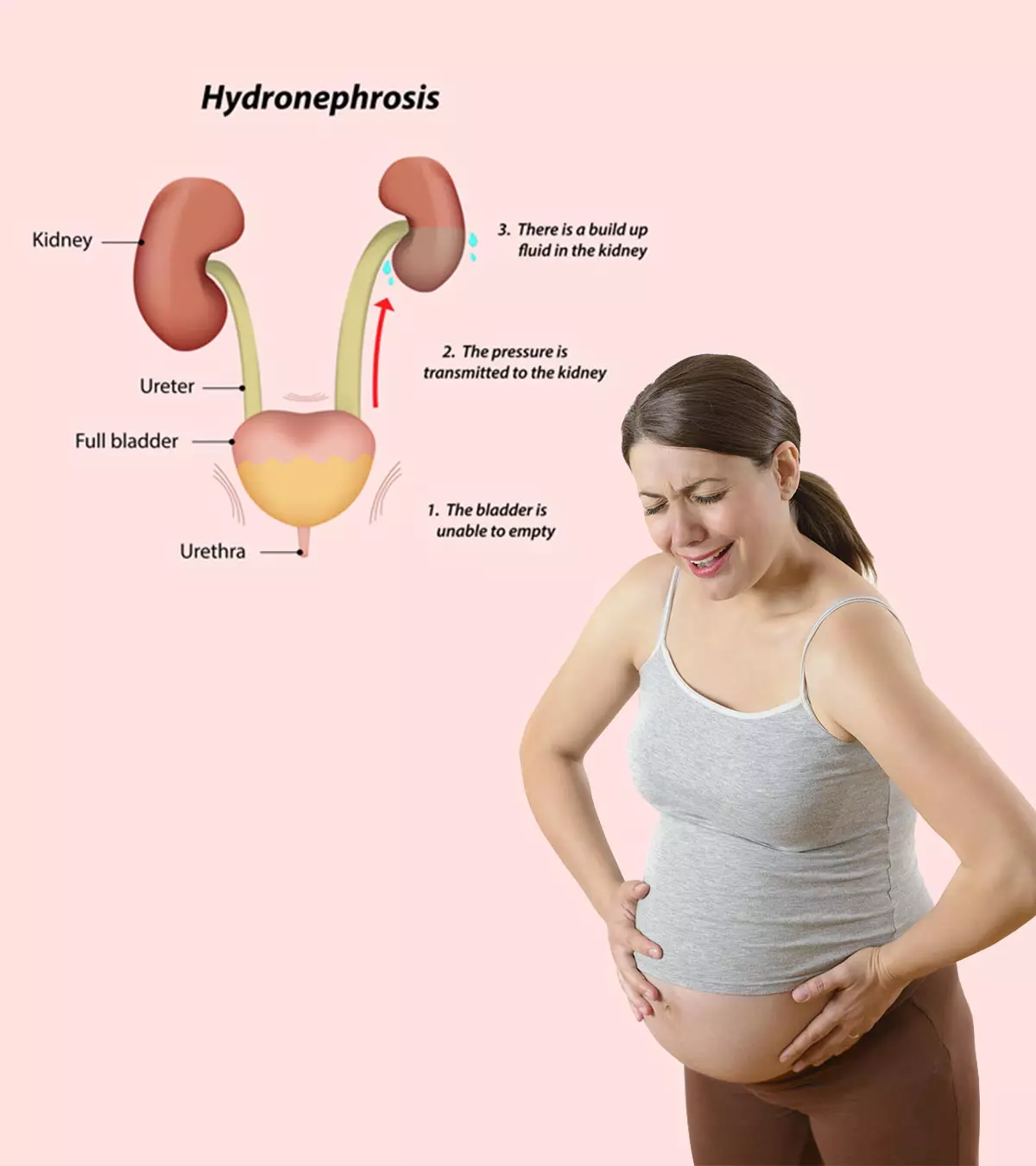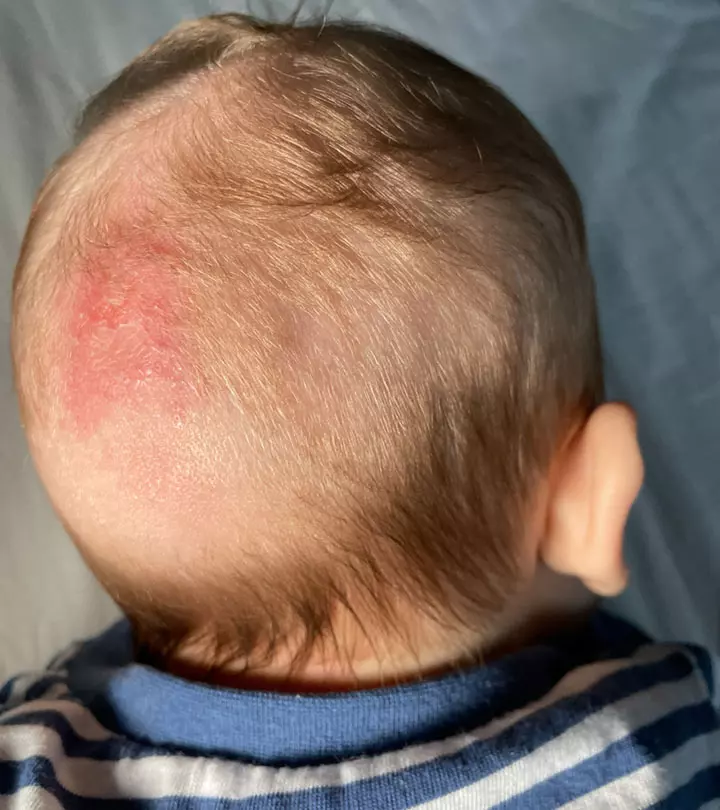
Image: iStock
Contracting croup during pregnancy may affect maternal health and result in more serious symptoms than when contracted at other times. Coughing and breathing difficulties at night are some common symptoms of croup. It is caused by the parainfluenza virus and results in inflammation of the larynx (vocal cords), bronchi, and trachea (windpipe).
Barking cough, which sounds similar to barking, is often seen in croup. This sound is produced when air is forcefully expelled while coughing through the airways narrowed by inflammation. It may also result in whistling sounds while you inhale (1).
Read on to learn more about the causes, symptoms, and treatments for croup during pregnancy.
Key Pointers
- Croup is an inflammation that affects the vocal cords, bronchial tubes, and windpipe, resulting in a cough that sounds like a bark.
- Pregnant women can develop croup due to various reasons such as viral infections, acid reflux, inhaling chemicals that cause blockages in throat passages, and inflammation of the epiglottitis.
- Chronic cough that sounds like a bark, whistling sound while breathing, sore throat, and shortness of breath are the common symptoms of croup.
- If you experience any symptoms of croup, seek medical advice from your doctor.
- Steam inhalation and saline gargles can alleviate discomfort associated with croup.
What Is Croup?

Croup is a respiratory infection that causes difficulty in breathing and a cough that sounds like barking. While suffering from this condition, the area around your vocal cords (larynx), bronchial tubes (bronchi) and windpipe (trachea) becomes inflamed. During dry cough in pregnancy, air is forced out through this passage that becomes narrow due to the swelling and your vocal cords produce a barking-like noise. Similarly, you may notice a whistling or wheezing like sound when you inhale (1).
 Quick fact
Quick factCroup And Pregnancy

Here are some causes of croup during pregnancy (2):
- The most common cause of croup is a viral infection. You may have inhaled the virus in the contaminated air.
- It can be caused by the inflammation of the epiglottitis (it is the flap at the base of your tongue that prevents food from getting into the windpipe).
- You may develop croup if you have accidentally inhaled chemicals and your throat and air passages get irritated.
- Sometimes, croup can also be due to acid reflux.
- If you are allergic to environmental elements like pollen or dust mites, you can develop croup when you accidentally inhale them.
What Are The Symptoms Of Croup?

The symptoms of croup will vary depending on the severity of the condition. Some of the most common symptoms of croup are (3):
- A persistent coughing that sounds like the barking of a seal.
- A whistling sound every time you take a deep breath.
- Pain or soreness in the throat.
- Shortness of breath.
- Blocked or stuffy nose.
- Mild or high temperature.
- Runny nose.
Immediately seek medical help if:

- You notice a high pitched sound both while inhaling and exhaling.
- You drool or experience difficulty in swallowing.
- You feel excessively anxious or tired.
- You find it difficult to breathe.
- The skin around your nose, fingernails or mouth starts turning blue or grayish (3).
 Quick fact
Quick factHow Is Croup Diagnosed?
Croup primarily affects children and not pregnant women. But if it does, it can cause discomfort and breathing difficulty. Your doctor may perform a thorough evaluation based on your medical history and physical examination (4). They will inquire about your symptoms, their duration, and severity. Physical examination will include the assessment of your breathing, abnormal sounds, and respiratory distress.
The doctor may investigate further if the diagnosis and symptoms are unclear and the initial treatment is ineffective. This may include:
- Chest X-ray to rule out respiratory problems.
- Blood tests to assess the presence of any viral or bacterial infection and inflammation.
- Pulse oximetry to determine the severity of the breathing difficulties.
Diagnosis in pregnant women may also involve considering the impact of croup on both maternal and fetal health. Doctors may do specific risk assessments to evaluate potential complications.
How To Treat Croup During Pregnancy?

While you are pregnant, your doctor will try and avoid all possible medication or procedures that may cause complications or harm your fetus or you. Depending on the severity of your condition, your doctor will suggest the following treatment (5):
- Your doctor may prescribe a mild pain relief medication to reduce the discomfort. Make sure you check with your doctor that this medication is safe for use during pregnancy.
- Speak to your doctor about the various liquids you can and should consume to ease the condition.
- In some cases, you may require an oxygen mask to ensure both you and your baby get adequate oxygen. Your doctor will recommend this if he notices any difficulty in your breathing.
- You may be advised to take steam inhalation or saline gargles for infection control.
- Discuss prenatal vitamins, including fish oil and vitamin D, with your healthcare provider, as they may help reduce the risk of respiratory infections, including croup, during pregnancy.
- In addition to medical treatments, several home care strategies may alleviate symptoms. These include using a humidifier to moisten the air, ensuring adequate hydration, and staying calm to reduce breathing distress.
Frequently Asked Questions
1. Is croup the same as whooping cough?
Whooping cough and croup are two different infections. While the parainfluenza virus causes croup, whooping cough is a bacterial infection.
2. What can be mistaken for croup?
The symptoms of croup can be mistaken for several upper respiratory tract infections and other severe conditions. Epiglottitis (swelling of the tissue protecting the windpipe), laryngomalacia, diphtheria, peritonsillar abscesses (infection in tonsils), and bronchitis during pregnancy are a few conditions that could be mistaken for croup (6). Dry cough during pregnancy may also be mistaken for croup, in some cases.
3. How long is croup contagious?
Croup is contagious as long as the symptoms persist. The neonate and mother might be contagious for up to three days after the infection is gone (7).
4. What happens if croup goes untreated?
Dr. Ila Dayananda, a board-certified obstetrician/gynecologist from Brooklyn, New York, says, “Most cases of croup resolve without complications, even without specific treatment. However, untreated croup can lead to complications such as respiratory distress or difficulty breathing, especially in severe cases. In rare instances, croup can progress to a more serious condition called epiglottitis, which requires immediate medical attention.”
Viral infection by parainfluenza virus is the leading cause of barking cough or croup during pregnancy. The cough in pregnancy occurs due to inflammation in the airways and may also cause wheezing during inhalation. Inhaling chemicals or pollutants or acid reflux may also trigger croup. Associated symptoms may include sore throat, breathing difficulties, and runny nose. The condition is treatable, and medications, oxygen support, or saline gargles may be advised for infection control depending on its severity. Avoid waiting until symptoms turn severe, and consult a doctor the moment you feel any discomfort or pain.
Infographic: How To Prevent Croup In Pregnancy?
Pregnant women have reduced immunity than others and get respiratory infections more easily. Infections can hurt both mother and baby and should be prevented. Check out the infographic to learn ways to prevent croup and other respiratory infections in pregnancy. Illustration: Momjunction Design Team
Illustration: Croup During Pregnancy: 5 Causes & 7 Symptoms You Should Be Aware Of

Image: Dall·E/MomJunction Design Team
References
- Ron L Moses et al.; (1997); Laryngotracheobronchitis in Pregnancy and its Clinical Implications.
https://journals.sagepub.com/doi/abs/10.1016/S0194-59989770283-3?journalCode=otoj - Croup.
https://111.wales.nhs.uk/Encyclopaedia/c/article/croup/#Causes - Parainfluenza.
https://medlineplus.gov/ency/article/001370.htm - Croup.
https://www.hopkinsmedicine.org/health/conditions-and-diseases/croup - A H Morice et al.; (2006); Recommendations for the management of cough in adults.
https://www.ncbi.nlm.nih.gov/pmc/articles/PMC2080754/ - Croup.
https://accounts.haymarketmedia.com/authcheck?gn=101&retUrl=https%3A%2F%2Fwww.cancertherapyadvisor.com%2Fhome%2Fdecision-support-in-medicine%2Fpediatrics%2Fcroup%2F&NoCheck=true - What is croup?
https://www.michiganmedicine.org/health-lab/what-croup
Community Experiences
Join the conversation and become a part of our nurturing community! Share your stories, experiences, and insights to connect with fellow parents.
Read full bio of Dr. Prachi Benara
- Dr. Ila Dayananda, a board-certified obstetrician & gynecologist, most recently served as the chief medical officer for Planned Parenthood of Greater New York. She studied medicine and master's in Public Health at Northwestern University Medical School and then pursued an OB/GYN residency at the Beth Israel Deaconess Medical Center in Boston, MA. Dr. Dayananda holds a Family Planning Fellowship at Brigham and Women's Hospital/Harvard Medical School in Boston, MA.
 Dr. Ila Dayananda, a board-certified obstetrician & gynecologist, most recently served as the chief medical officer for Planned Parenthood of Greater New York. She studied medicine and master's in Public Health at Northwestern University Medical School and then pursued an OB/GYN residency at the Beth Israel Deaconess Medical Center in Boston, MA. Dr. Dayananda holds a Family Planning Fellowship at Brigham and Women's Hospital/Harvard Medical School in Boston, MA.
Dr. Ila Dayananda, a board-certified obstetrician & gynecologist, most recently served as the chief medical officer for Planned Parenthood of Greater New York. She studied medicine and master's in Public Health at Northwestern University Medical School and then pursued an OB/GYN residency at the Beth Israel Deaconess Medical Center in Boston, MA. Dr. Dayananda holds a Family Planning Fellowship at Brigham and Women's Hospital/Harvard Medical School in Boston, MA.
Read full bio of shreeja pillai
Read full bio of Rebecca Malachi
Read full bio of Dr. Joyani Das


















